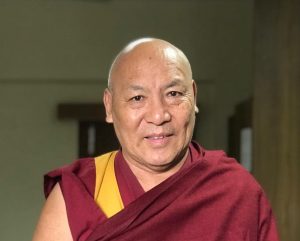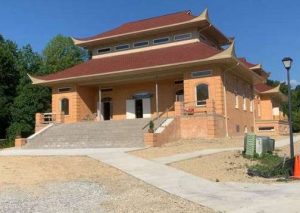
People in the United States seem to be having difficult conversations: about politics, about race, about the economy, and about the environment. For American Buddhists, these issues inevitably end up with us on the cushion. Some meditation groups may be looking inward, wondering if their own sangha is as welcoming and equitable as they would like it to be. Some may be struggling with how hope and hopelessness braid together in the US media, and wondering how to bring dialogue about daily events into the sangha. These are difficult conversations to have, and that’s where Mushim Patricia Ikeda steps in.
A teacher at the East Bay Meditation Center in Oakland, California, Mushim Patricia Ikeda is a “a socially-engaged Buddhist teacher, mindfulness meditation teacher, social justice activist, author, and diversity and inclusion facilitator,” according to her website. She is concerned not only with the teachings of the Buddha, but in how they interact with practitioners’ daily lives and identities. Her work brings issues about race, gender, sexuality, ability, and equality squarely into the sangha circle, helping to facilitate thoughtful and tough conversations. In service to Buddhist and social justice ideals, which she says are often intertwined, Ikeda is building community through compassionate dialogue.
Ikeda didn’t always aspire to be a meditation teacher. She grew up in rural Ohio, in the Midwestern US, during the 1960s. Unlike the many Christian families in the area, her family was not religious, and they were also the only people of color around. She felt pressure to perform as a model minority, an experience that formed her early consciousness about identity: “I know what it means to be the other and the cost that comes with that, and that has very much influenced my commitment to engagement and social justice now,” she says.
Ikeda ended up studying poetry at the prestigious Iowa Writer’s Workshop, preparing for a career in academia. The brilliance of her peers thrilled her, but what Buddhists would consider misconduct with drugs, alcohol, and sex wore her down. The graduate program was “filled with wonderful people and art, and also all this toxic stuff,” she says. “It wasn’t a moral judgment, I just thought I’m not physically tough enough to do this!” Her sister, a professor of Japanese language and literature, had been sending her books on Japanese tea ceremonies. The connection between the arts—Ikeda’s discipline—and Zen Buddhism caught her eye. “I could recognize as a student of literature that they really resonated,” she said.
But Zen teachings urged her away from too much reading and onto the cushion. She began to meditate on her own, and “it gave me a tiny feeling of the promise of the practice,” she recalls. In 1982 she left Iowa and moved to Ann Arbor, Michigan, where she worked part-time in an office and began attending a Korean Zen temple. That led to six years of wandering, which took her to monasteries in Korea to explore her burgeoning interest in Buddhism in more depth.
Ikeda returned to lay life in 1988, settling down in California to start a family and continue her rigorous Zen practice. Raising children was essential to her Buddhism. At a challenging session, four-and-a-half months pregnant and deep in koan practice, Ikeda received an instruction from her teacher: you must educate baby. “And I was like, YES SIR! I have my marching orders, I shall go forth and do that,” she says. “That formed everything else I did from there on out.”
Recognizing that the outside world—family, employment, housing, and politics—impacts practice has been a big part of Ikeda’s work. She has helped to build the East Bay Meditation Center into a diverse sangha, one that embraces difference and talks openly about it. “We have a wonderful set of agreements for multicultural interactions. Those are actual practices that I’ve done numerous trainings on, huge banners in every room. They are the basis of our community life,” she explains. “They offer us the only protection we have that people can learn what in terms of behaviors is going to help us be one sangha.”
Ikeda also helps other sanghas to develop their own guidelines and conversations. She says many ask for help on creating inclusive, diverse spaces, but she’s quick to point out a quirk of language: “Diversity is always a code word that points toward inequities in power and privilege,” she says. It’s hard for many meditation groups to acknowledge inequality between their members and talk easily about it—everything from whether someone in the sangha lacks food or rent money to whether a practitioner needs extra accommodations for a disability. This is why she advises meditation groups to hire outside consultants to lead these difficult conversations.
“What we call the work of developing true inclusivity in a sangha, it’s difficult, it’s painful, it’s challenging. It’s also deeply rewarding,” she says. “People understandably focus on the pain of opening up topics such as racism or homophobia in our own group. We’re afraid of that pain, but as Dr. [Martin Luther] King said, we need to keep our eyes on the prize of developing the faith.”
She says that Buddhist practice inherently has the tools to help communities toward these goals. “Buddhist practice and teachings have so much potential there to enable individuals and sanghas to really open up and look at [inequity] carefully, mindfully, slowly, at a rate that people can absorb,” she says.
One thing she thinks US sanghas have done well is to elevate women into leadership positions. This has helped facilitate conversations about equality in the groups—though not always comfortably. “I remember years ago, one Buddhist man I know was upset; he said, ‘I don’t like it that the women are meeting separately—after all, what are they going to be talking about that they couldn’t just say to me?’” She recalls telling him to deal with it. Sometimes, people need “safer spaces where they feel comfortable to bring their whole self. They gain confidence and they gain courage.” These types of dialogues draw up deep discomfort, Ikeda says, but they can be held within the space of meditation, just like anything else that arises on the cushion.
Ikeda advises sangha groups not to immediately tackle big issues in politics and national social movements, but to begin with their own community. “Compassionate community dialogue means identifying resources for those among us in our own sangha who might be facing a lack of resources in the basics: food, shelter, clothing, jobs. That’s a good place to start.”
She says dealing with a surface solution, for example giving food to the hungry, isn’t useful enough. Consultants like herself urge conversations to go deeper: what are the systemic issues that cause hunger, and how are we as Buddhists equipped to help? This “engaged Buddhism” has been explored in other ways by teachers such as Thich Nhat Hanh; the idea is to look at practice through a social justice lens, Ikeda says.
Fundamentally, the work of creating compassionate, healthy communities is one more way to practice. “This work in our sanghas has the potential for bringing so much joy, so much happiness, and opening the path to awakening that is the very essence of the Buddha’s teachings,” says Ikeda.
See more
Mushim Patricia Ikeda
East Bay Meditation Center
Related features from Buddhistdoor Global
A Buddhist Garden of Peace in Rural Montana
The Gift of Zazen: Angie Boissevain
Jungmyungsa Buddhist Temple: A Haven of Korean Buddhism in Queens
Curiosity and Doubt: The Spiritual Career of Judith Simmer-Brown
Standing Together: Rev. Angel Kyodo Williams’ Radical Dharma – Book Review











